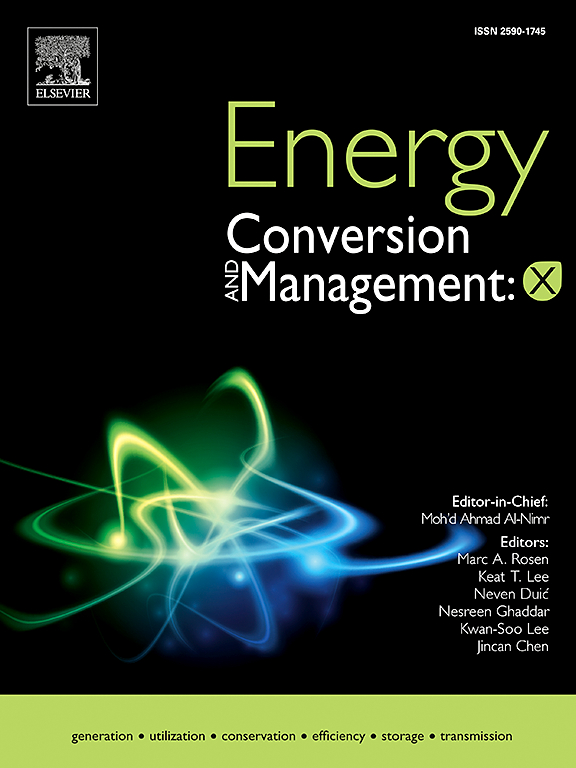Evaluation of Green and Blue Hydrogen Production Potential in Saudi Arabia
IF 7.1
Q1 ENERGY & FUELS
引用次数: 0
Abstract
The Kingdom of Saudi Arabia has rich renewable energy resources, specifically wind and solar in addition to geothermal beside massive natural gas reserves. This paper investigates the potential of both green and blue hydrogen production for five selected cities in Saudi Arabia. To accomplish the said objective, a techno-economic model is formulated. Four renewable energy scenarios are evaluated for a total of 1.9 GW installed capacity to reveal the best scenario of Green Hydrogen Production (GHP) in each city. Also, Blue Hydrogen Production (BHP) is investigated for two cases of Steam Methane Reforming (SMR) with different percentages of carbon capture. The two BHP scenarios were compared with a base case scenario of hydrogen production from natural gas without CCS/U (gray hydrogen). The economic analysis for both GHP and BHP is performed by calculating the Levelized Cost of Hydrogen (LCOH) and cash flow. The LCOH for GHP range for all cities ($3.27/kg–$12.17/kg)) with the lowest LCOH is found for NEOM city (50% PV and 50% wind) ($3.27/kg). LCOH for the three SMR cases are $0.534/kg, $0.647/kg, and $0.897/kg for SMR wo CCS/U, SMR 55% CCS/U, and SMR 90% CCS/U respectively.
沙特阿拉伯绿色和蓝色氢气生产潜力评估
沙特阿拉伯王国拥有丰富的可再生能源资源,特别是风能和太阳能,此外还有大量的地热和天然气储备。本文研究了沙特阿拉伯五个选定城市生产绿色和蓝色氢气的潜力。为实现上述目标,本文建立了一个技术经济模型。对总装机容量为 1.9 千兆瓦的四种可再生能源方案进行了评估,以揭示每个城市绿色制氢(GHP)的最佳方案。此外,还研究了两种蒸汽甲烷转化(SMR)情况下的蓝色制氢(BHP),碳捕集比例各不相同。这两种 BHP 方案与不使用 CCS/U 的天然气制氢(灰色制氢)的基本方案进行了比较。GHP 和 BHP 的经济分析都是通过计算氢气的平准化成本 (LCOH) 和现金流来进行的。所有城市 GHP 的 LCOH 范围为(3.27 美元/千克-12.17 美元/千克),其中 NEOM 城市(50% 光伏和 50% 风能)的 LCOH 最低(3.27 美元/千克)。三种 SMR 情况下的 LCOH 分别为 0.534 美元/千克、0.647 美元/千克和 0.897 美元/千克(SMR wo CCS/U、SMR 55% CCS/U 和 SMR 90% CCS/U)。
本文章由计算机程序翻译,如有差异,请以英文原文为准。
求助全文
约1分钟内获得全文
求助全文
来源期刊

Energy Conversion and Management-X
Multiple-
CiteScore
8.80
自引率
3.20%
发文量
180
审稿时长
58 days
期刊介绍:
Energy Conversion and Management: X is the open access extension of the reputable journal Energy Conversion and Management, serving as a platform for interdisciplinary research on a wide array of critical energy subjects. The journal is dedicated to publishing original contributions and in-depth technical review articles that present groundbreaking research on topics spanning energy generation, utilization, conversion, storage, transmission, conservation, management, and sustainability.
The scope of Energy Conversion and Management: X encompasses various forms of energy, including mechanical, thermal, nuclear, chemical, electromagnetic, magnetic, and electric energy. It addresses all known energy resources, highlighting both conventional sources like fossil fuels and nuclear power, as well as renewable resources such as solar, biomass, hydro, wind, geothermal, and ocean energy.
 求助内容:
求助内容: 应助结果提醒方式:
应助结果提醒方式:


